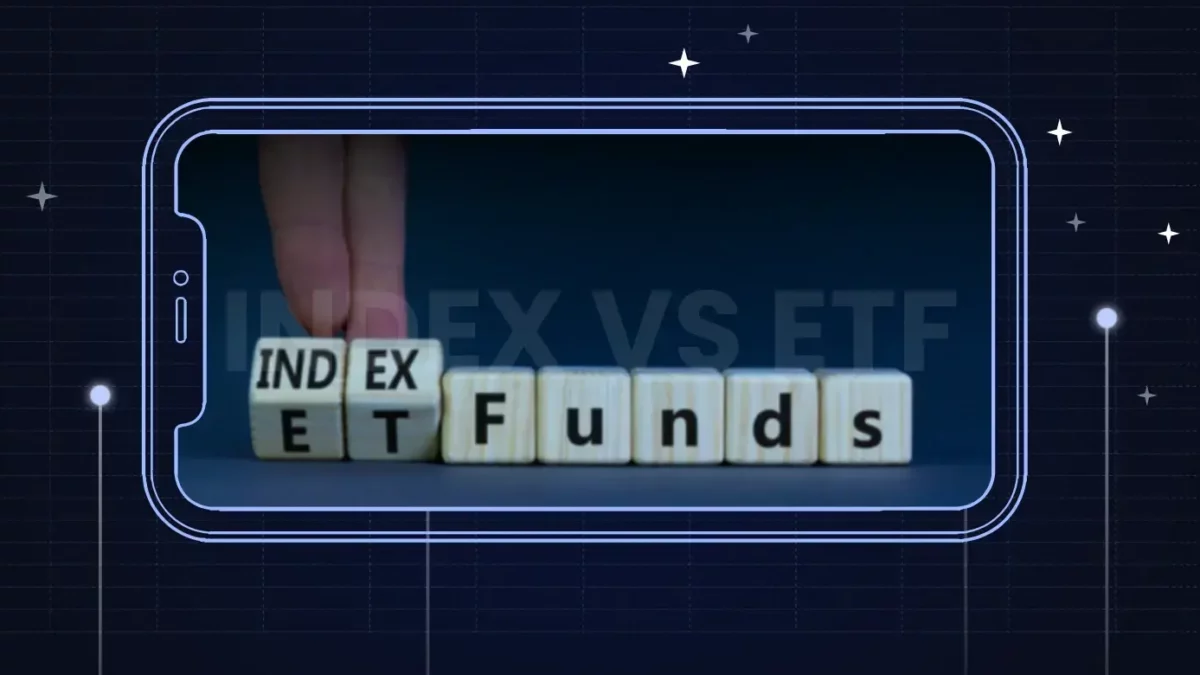Table of Contents
ToggleKey Takeaways:
- Mutual funds function as collective investment pools overseen by a professional fund manager.
- Exchange-traded funds (ETFs) consist of baskets of securities traded on an exchange, akin to individual stocks.
- ETFs offer the flexibility of buying or selling at any point during market hours.
- Mutual funds, in contrast, are valued only at the trading day’s close.
- Regarding cost and tax efficiency, ETFs generally outperform comparable mutual funds.
An Overview of Crypto Index Funds vs Crypto ETFs
If you are doing your research on investing in the asset markets, they can be a rewarding but complex endeavor. While exploring, investors often encounter two popular investment vehicles: Index Funds and Exchange-Traded Funds (ETFs). In this guide, we will break down these instruments, highlighting their key features, types, and differences.
Gaining proficiency in investment fundamentals involves varied distinctions, such as between an index fund and an exchange-traded fund (ETF). Notably, ETFs are deemed more accessible for both entry and exit compared to the majority of mutual funds. The ease of trading ETFs surpasses index funds, similar to how common stocks are traded on a stock exchange.
Furthermore, investors can acquire ETFs in smaller increments and encounter fewer obstacles compared to mutual funds. Opting for ETFs allows investors to sidestep the need for specialized accounts and documentation, a requirement often associated with mutual funds.
Despite their numerous similarities, let us take a deeper look into the variances between an index fund and an ETF.
What is an Index Fund?
A crypto index fund is a financial instrument that allocates investments to crypto featured in a designated crypto index, closely mirroring the index’s performance. Numerous exchange-traded funds (ETFs) and mutual funds have begun to follow suit by tracking crypto indexes.
Before delving into crypto indices, let’s discuss index funds more broadly. An index fund, a subtype of mutual funds, comprises pooled investor funds. The fund manager invests in securities, yet unlike traditional mutual funds, an index fund lacks an active manager and instead invests in a specific stock index. These indices consist of securities representative of the overall market, such as the USA 500 index, encompassing 500 major U.S. corporations.
Index funds typically boast lower costs compared to actively managed mutual funds due to their passive management approach. The expense ratio, representing the fee levied by each fund as a percentage of assets under management, tends to be more economical.
As implied by its name, a crypto index fund focuses exclusively on a specific type of crypto. While still largely theoretical, crypto index funds are gaining traction as investor interest grows. Crafting a conventional investment tool that monitors multiple crypto types proves challenging, but ongoing efforts are being made.
Here are some key characteristics of index funds in general:
- Passive Management: Index funds are managed passively, which means they aim to mirror the performance of a designated market index rather than making active investment decisions. This passive approach typically results in lower management fees compared to actively managed funds.
- Diversification: By tracking a specific market index, index funds inherently offer a diversified portfolio. Investors are exposed to an array of assets within the index, reducing the impact of poor performance by any single security.
- Low Costs: One of the primary advantages of index funds is their cost-effectiveness. Since they operate on a passive management strategy, there is less need for extensive research and frequent trading, leading to lower fees for investors.
- Transparency: The holdings of an index fund are typically transparent and are known to investors. This transparency allows investors to see the composition of the fund’s portfolio and understand the specific assets they are invested in.
- Long-Term Focus: Index funds are often favored by investors with a long-term investment horizon. The goal is to capture the overall market return over time rather than trying to outperform the market in the short term.
Popular market indices that serve as benchmarks for index funds include the S&P 500, Dow Jones Industrial Average, Russell 2000, and various global indices. Investors interested in a simple, low-cost, and diversified approach to investing often consider index funds as part of their investment strategy.
What is an ETF?
A crypto ETF, or Exchange-Traded Fund, is a type of investment fund that is traded on stock exchanges and aims to replicate the performance of a specific crypto index or market segment. Unlike traditional index funds, ETFs provide investors with the ability to buy and sell shares throughout the trading day, similar to individual stocks.
Exchange-traded funds (ETFs) focused on crypto monitor the price performance of one or more digital assets by investing in a portfolio linked to their respective instruments. Similar to conventional ETFs, these crypto ETFs are traded on regular stock exchanges, providing investors the convenience of holding them in standard brokerage accounts. This approach allows individuals to gain exposure to crypto price movements without engaging directly on a crypto exchange or dealing with the intricacies and costs associated with owning digital assets outright. However, it’s worth noting that crypto ETFs can be pricier compared to other types of ETFs.
Despite a growing array of ETFs offering investors access to various market segments and commodities, the Securities and Exchange Commission (SEC) has, after approximately a decade of regulatory deliberation, not yet sanctioned an ETF directly holding crypto assets. While the approval of such an ETF remains pending, crypto has still found its way into mainstream investment avenues through alternative channels.
Overall, ETFs had become popular investment vehicles due to their flexibility, liquidity, and cost-effectiveness, offering investors a diverse array of options for building a well-balanced portfolio.
Learn More: How to Use Index Funds and ETFs to Earn Passive Crypto Income?
7 Types of Crypto Exchange Traded Funds
| ETF | DESCRIPTION |
|---|---|
| Amplify Transformational Data Sharing ETF (BLOK) | An ETF concentrating on companies involved with crypto or providing indirect crypto price exposure. |
| Bitwise 10 Crypto Index Fund (BITW) | A convenient way to invest in the top 10 largest crypto. |
| Siren Nasdaq NexGen Economy ETF (BLCN) | An ETF investing in companies engaged in the development and utilization of blockchain technology. |
| First Trust Indxx Innovative Transaction & Process ETF (LEGR) | A diversified fund encompassing crypto, tech, banking, and international stocks. |
| Bitwise Crypto Industry Innovators ETF (BITQ) | An ETF focused on innovative companies within the crypto economy. |
| Global X Blockchain ETF (BKCH) | A fund betting on blockchain technology and its broader applications beyond crypto. |
| Global X Blockchain & Bitcoin Strategy ETF (BITS) | This ETF is 50% invested in the affiliated Global X Blockchain ETF, supplemented with Bitcoin futures. |
Source: Fool.com
Know More: Top Bitcoin ETFs
What are Bitcoin ETFs and Ethereum ETFs?
Bitcoin ETFs and Ethereum ETFs are funds traded on exchanges that mirror the value of Bitcoin, allowing investors to access the crypto asset via conventional stock market platforms. The purpose of these ETFs is to streamline Bitcoin and Ethereum trading by providing a regulated and transparent investment option.
In the United States, there are currently two categories of crypto ETFs:
- Spot Market ETFs
- Futures Market ETFs.
As of now, the US Securities and Exchange Commission (SEC) has granted approval exclusively to Futures Market ETFs for Bitcoin and Ethereum, withholding approval for any Spot Bitcoin or Ethereum ETFs. More updates on this on Crypto News.
Additional Read: Bitcoin Spot ETFs vs Bitcoin Futures ETF
What is the Difference Between an Index Fund and an ETF?
While Index funds and Exchange-Traded Funds (ETFs) share the common goal of mirroring the performance of specific indices, their structures and operational mechanisms differ significantly.
| Aspect | Index Fund | Exchange-traded fund (ETF) |
|---|---|---|
| Management Structure | Typically, index funds are managed by investment firms or fund companies. | ETFs can be managed by various entities, including investment firms or banks. |
| Trading Method | Traded at the end of the day based on the NAV. | ETFs can be traded all through the trading day on stock exchanges at the market prices. |
| Minimum Investment | Some index funds may have minimum investment requirements. | ETFs are traded in the open market, allowing investors to buy and sell any number of shares at market prices. |
| Investment Approach | Primarily follows a passive investment strategy, aiming to replicate the performance of a specific index. | Can be passively managed, tracking an index, or actively managed, with fund managers making strategic investment decisions. |
| Flexibility | Typically offers less intraday flexibility as transactions are processed at the end of the day. | Offers intraday flexibility, allowing investors to enter or exit positions at any point during market hours. |
| Costs | Expense ratios are generally low for index funds. | Expense ratios can vary; some ETFs offer low expense ratios, while actively managed ETFs may have higher costs. |
| Initial Capital Requirement | May have minimum initial investment requirements. | No minimum investment requirement, allowing investors to start with any number of shares. |
| Dividend Reinvestment | Dividends are typically reinvested at the end of the trading day. | Dividends can be reinvested or paid out in cash, depending on the investor’s choice. |
| Purchase and Redemption Method | Shares are bought and redeemed directly from the fund company at the NAV. | Creation and redemption occur through authorized participants, who exchange a basket of assets for ETF shares, helping keep the market price close to the NAV. |
ETFs vs Index funds: Key similarities
While their structures and trading mechanisms differ, ETFs and index funds share several key similarities:
- Passive Management: Both aim to replicate the performance of a specific index passively.
- Diversification: Investors benefit from instant diversification by investing in a basket of assets.
- Low Costs: Generally, both types of funds have lower fees compared to actively managed funds.
Risks associated with ETF & Index Funds
Investing in crypto index funds and ETFs involves various risks that necessitate careful consideration. The value of these investment options is susceptible to the notable volatility inherent in the crypto market. To address this, spreading risk through diversification and regular portfolio rebalancing can prove effective.
Moreover, the evolving regulatory landscape introduces legal risks, emphasizing the importance of investor education and the selection of compliant funds. Opting for well-established funds with robust security measures becomes crucial, as reliance on third-party intermediaries and custodians can pose counterparty risks.
Lastly, the potential emergence of liquidity risk is linked to low trading volumes in a fund, making it challenging to execute transactions at desired prices. Conducting thorough research and evaluating a fund’s liquidity before making an investment can contribute to mitigating this specific risk.
Conclusion
In the dynamic world of investing, understanding the nuances between crypto index funds and crypto ETFs is crucial for making informed decisions. Whether you prefer the simplicity of index funds or the intraday trading flexibility of ETFs, both instruments offer effective ways to diversify your crypto portfolio and pursue long-term financial goals. By understanding the unique features and differences outlined in this guide, you’ll be better equipped to navigate the ever-evolving landscape of investment opportunities.
However, both options are yet to be dived into and understood to give approvals; it is imperative to do your own research and align your investment strategy with the trading options available for you to explore.
Related posts
Understanding the Different Types of Cryptos: Coins, Tokens, Altcoins & More Explained
Explore the major types of crypto assets and their unique roles.
Read more
PAWS Telegram Game: The New Tap to Earn Game That Is Beating Hamster Kombat
Discover how to play and earn with PAWS Telegram game.
Read more


